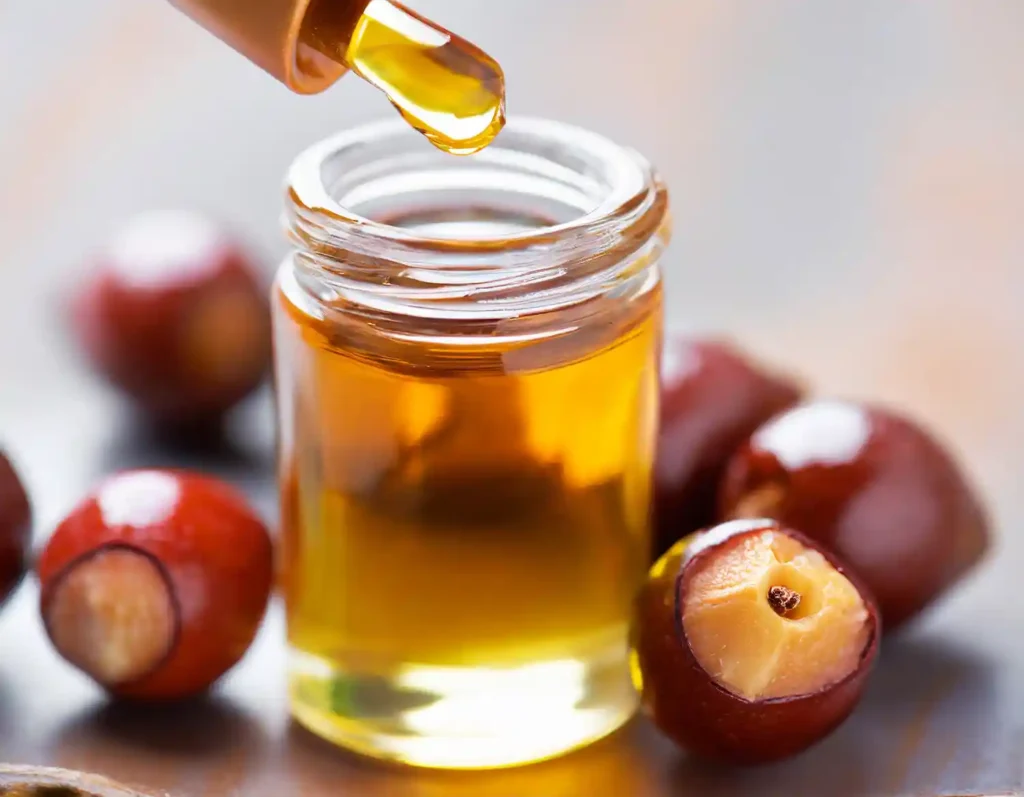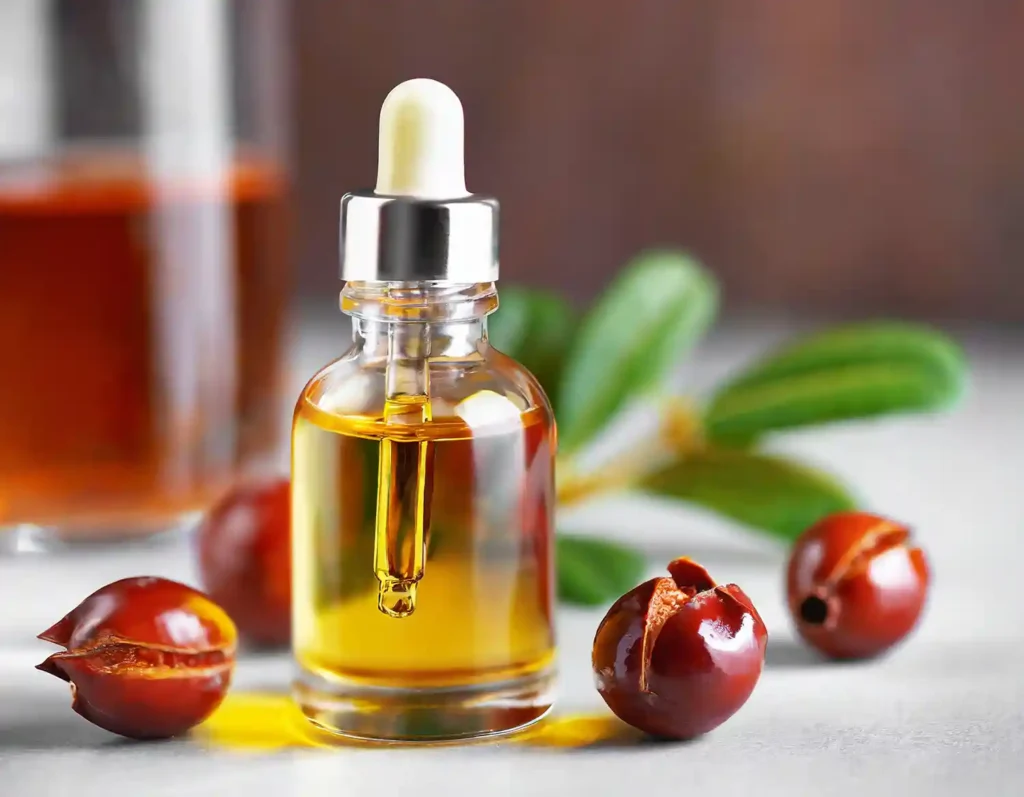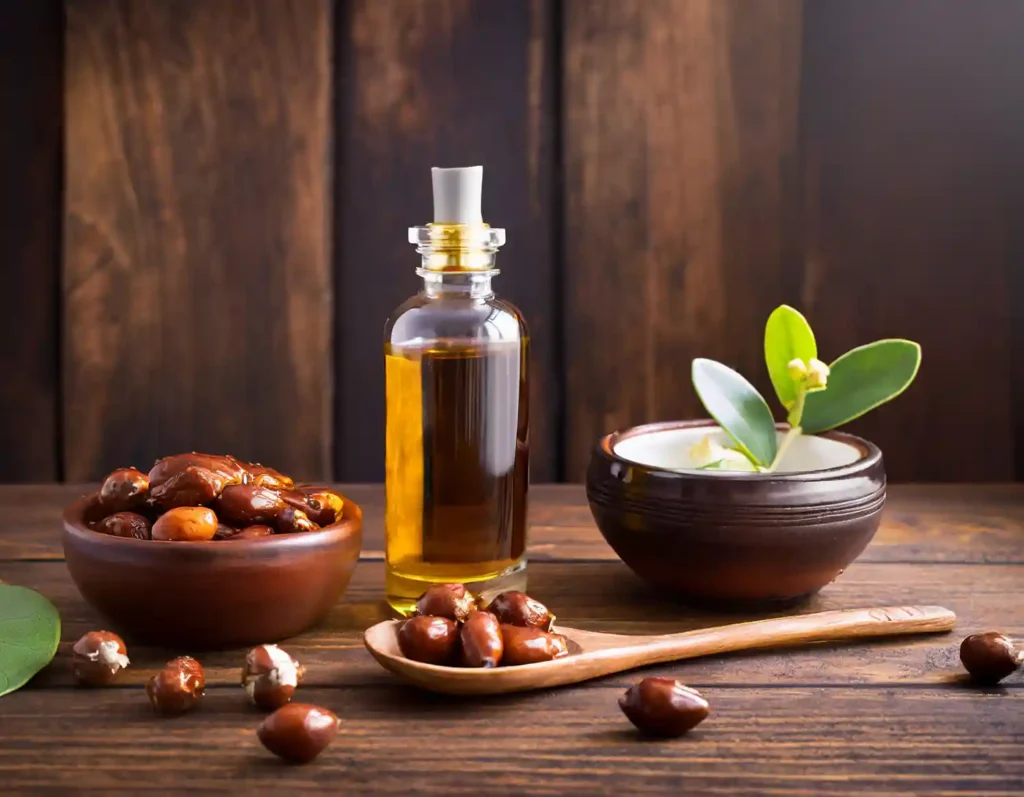Jojoba oil, a remarkable natural product, has gained immense popularity in the beauty and health industry. Extracted from the seeds of the jojoba plant, this oil is unique in its chemical structure and offers many benefits for skin and hair care.
What is Jojoba Oil?
Natural jojoba oil is a golden liquid wax extracted from the nut of the jojoba plant, scientifically known as Simmondsia chinensis. Native to North America, this plant thrives in harsh desert climates.
Unlike typical vegetable oils, jojoba oil’s structure closely resembles human sebum, which the body produces naturally, and when used, it can be helpful as it balances natural oil production. It is a natural, gentle, and versatile choice for all skin types.
The Origin and Composition of Jojoba Oil
The jojoba plant has been a valuable resource for centuries. Native Americans have traditionally used it for its many healing properties.
Its unique composition of long-chain fatty acids and natural antioxidants, including vitamin E, gives it a stable shelf life and enhances its restorative properties. This composition is key to jojoba oil’s ability to moisturise, soothe, and protect the skin and hair.


Jojoba Oil Benefits for The Skin
Jojoba oil is a powerhouse in skin care, offering a range of benefits that cater to various skin types and conditions. Its unique composition makes it a versatile and effective ingredient in many skin care routines.
It’s Helps Keep Dry Skin Hydrated
One of the most celebrated benefits of jojoba oil is its ability to help maintain hydration in the skin by preventing trans-epidermal water loss (TEWL). Its similarity to the skin’s natural oils allows it to act as an emollient to help soften the skin whilst providing moisture without leaving an oily residue. This makes it ideal for oily and dry skin types, naturally balancing the skin’s hydration levels.
Jojoba Oil for Sensitive and Acne Prone Skin
For acne-prone or sensitive skin, jojoba oil can be a game-changer. Its non-comedogenic nature means it won’t leave clogged pores, reducing the likelihood of breakouts.
Additionally, its anti-inflammatory properties help soothe irritated skin, reducing redness and calming inflammation.
The waxy composition of jojoba Oil, closely resembling the body’s natural sebum, is advantageous for skin prone to blemishes. It aids in supporting the regulation of the skin’s natural oil production, functioning similarly to sebum by protecting and hydrating the skin.
Anti-Aging Properties and Wrinkle Reduction
Rich in antioxidants and natural vitamin E, jojoba oil is a natural choice for combating the signs of ageing. It may help to reduce the appearance of fine lines and wrinkles, improving skin elasticity and promoting a youthful glow.
It Has Some Antibacterial Properties
Along with its antimicrobial and antifungal qualities, jojoba has been found to have some antibacterial properties. It may be effective against specific strains, including those responsible for salmonella, E. coli infections, and candida.
Healing Scars and Sunburn Relief
Jojoba oil’s potential healing properties extend to improving the appearance of scars and providing relief from problems, for example, after sunburn. It not only soothes sunburn once the initial inflammation and redness have been addressed, but its emollient properties can also help reduce the likelihood of excessive peeling.
Its vitamin E content and essential fatty acids often aid skin repair and regeneration. Studies have found that Jojoba Liquid Wax may assist wound healing and minimise scar tissue. The naturally occlusive nature of Jojoba Liquid Wax provides a protective layer that enables the body’s natural wound healing abilities to get to work.
How to Use Jojoba Oil in Your Skin Care Routine
Incorporating jojoba oil into your skincare routine is simple and effective for various skin concerns.
As a Moisturiser: Apply a few drops of jojoba oil directly onto your face after cleansing. Gently massage it in until fully absorbed. Its lightweight texture makes it perfect for daily use, morning or night.
For Acne Treatment: Apply a small amount of jojoba oil onto clean skin, focusing on acne-prone areas.
As an Anti-Aging Serum: Use jojoba oil as a serum before your regular moisturiser. Its antioxidant properties help fight signs of ageing and improve skin elasticity.
For Scar and Sunburn Care: Gently dab jojoba oil on scars or sunburnt areas once the initial heat has resolved. Its potential healing properties may aid in skin repair and reduce inflammation.
In DIY Face Masks: Mix jojoba oil with other natural ingredients like green clay or kaolin to create your own clay face masks. This can help clarify the skin and reduce oiliness.
Remember, a little goes a long way, so start with a small amount and adjust as needed for your skin type.


Jojoba Oil for Hair Care
Jojoba oil is not just a skin wonder; it’s also a boon for hair health. Its unique properties make it an excellent ingredient for nourishing, strengthening, and revitalising hair.
Strengthening and Nourishing Your Hair
Jojoba oil’s rich composition is ideal for strengthening hair. It’s effective for use on dry hair, where it helps to moisturise the hair follicles, preventing dryness and breakage. Regular use may lead to thicker, stronger, and healthier hair.
Promoting Hair Growth
Due to its chemical composition of long-chain fatty acids and natural antioxidants, including vitamin E, jojoba oil may also contribute to hair growth by nourishing the scalp and hopefully stimulating the follicles to grow new hair.
Jojoba Oil as a Natural Remedy for Scalp Issues
For those struggling with dry or itchy scalps, jojoba oil can be a natural remedy that may help maintain scalp health, reduce dandruff, and soothe scalp irritation. Its moisturising effect also balances scalp oil production, which is beneficial for dry and oily scalps.
Enhancing Hair Shine and Softness
The oil’s conditioning properties impart a natural shine and softness to hair. Applying it to the ends of your hair can help manage frizz and enhance the overall texture and appearance of your hair.


Other Uses and Benefits of Jojoba Oil
Beyond hair and skin care, the benefits of jojoba oil extend to various other beauty and health applications from makeup remover to cuticle care, showcasing its multifaceted benefits.
Jojoba Oil in Everyday Beauty Products
Due to its versatile properties, jojoba oil can be found in many commercial beauty products, including lip balm, lotions, and makeup.
Unique Uses: From Makeup Removal to Cuticle Care
As a gentle yet effective makeup remover, jojoba oil can safely remove waterproof makeup without irritating the skin.
It’s also excellent for cuticle care, providing moisture and promoting healthy nail growth.
Additionally, its soothing properties make it ideal for use after shaving, helping to calm and moisturise the skin.
Therapeutic Uses of Jojoba Oil
Jojoba oil can be used in aromatherapy and massage or as a carrier oil mixed with essential oils. Its anti-inflammatory properties and ability to absorb easily into the skin make it a preferred choice for therapeutic massages.
How to Choose and Use Jojoba Oil
Selecting the right jojoba oil and using it correctly can significantly enhance its benefits. Here are some tips to help you make the most out of this versatile oil.
Selecting the Right Jojoba Oil
When choosing jojoba oil, opt for 100% pure, cold-pressed oil. This ensures that the oil retains its natural properties and is additives-free. Organic pure jojoba oil is preferable as it guarantees the absence of pesticides and chemicals. The oil should be clear to a light golden colour and have a mild, nutty scent.
Application Tips and Best Practices
For Skin: Apply a few drops to clean, damp skin for better absorption. It can be used alone or mixed with your regular moisturiser.
For Hair: Warm a few drops in your hands and apply to the ends of damp hair for smoothing, or massage into the scalp before shampooing for a deep treatment.
For Nails: Massage a small amount into cuticles to soften and nourish them.
As a Carrier Oil: Mix jojoba oil with essential oils for aromatherapy or therapeutic massage.
Patch Testing for Allergy Prevention
Before using jojoba oil, especially if you have sensitive skin, perform a patch test to check for any possible allergic reaction. Apply a small amount on your inner forearm and wait 24 hours to check for any adverse reactions.
Storing and Preserving Jojoba Oil
Store jojoba oil in a cool, dark place to maintain its efficacy. Properly stored, it has a longer shelf life than other oils due to its wax-like structure, which is less rancid prone.


Conclusion
Jojoba oil is a versatile and beneficial natural product suitable for various skin and hair care needs. Its unique composition, closely resembling human sebum, makes it a gentle yet effective choice for moisturising, healing, and protecting.
Jojoba oil is a valuable addition to any beauty regimen, whether used for its hydrating properties, anti-ageing benefits, or as a natural remedy for scalp and hair issues. Embracing this natural wonder may lead to healthier skin and hair, showcasing the power of nature in everyday self-care.






